Kareela (ferry)
Kareela was a "K-class" ferry on Sydney Harbour. Launched in 1905, the double-ended timber-hulled steamer was built for Sydney Ferries Limited in response to the early twentieth century boom in cross-harbour ferry travel prior to the opening of the Sydney Harbour Bridge. She was the first of Sydney Ferries Limited's boats to have a fully enclosed upper deck.
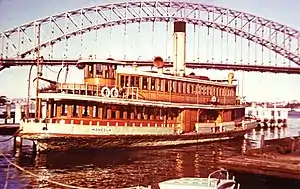 Kareela at Sydney Ferries Limited base, McMahons Point 1950s | |
| History | |
|---|---|
| Name: | Kareela |
| Operator: | |
| Builder: | Morrison & Sinclair Ltd |
| Launched: | 1905 |
| Out of service: | 1959 |
| Fate: | broken up |
| General characteristics | |
| Tonnage: | 186 tons |
| Length: | 34.4 m |
| Speed: | 10 knots |
| Capacity: | 784 passengers approx. |
She survived the 1932 opening of the Sydney Harbour Bridge when many ferries were removed from service, and also the early 1950s rationalisation of the fleet following NSW Government takeover. Nicknamed "The Box", she had a relatively incident free career apart from a collision with a wharf that killed three of her passengers. She was sold in 1959 and broken up.
"Kareela" is thought to be an Australian Aboriginal word meaning "south wind".
Background
Kareela was built for Sydney Ferries Limited during the early twentieth century boom in cross-Harbour travel prior to the 1932 opening of the Sydney Harbour Bridge. At the time, the company ran one of the largest ferry fleets in the world. A population boom in the suburbs of Neutral Bay, Cremorne, and Mosman saw them served by an increasing number of ferries. The ferry was part of a broader type of around 20 double-ended timber screw ferries the Sydney K-class ferries that the company commissioned between the 1890s and early 1920s to meet the booming demand.
Kareela followed the Sydney Ferries Limited tradition of naming their vessels after Australian Aboriginal words starting with "K". "Kareela" is thought to mean "south wind".
Design and construction
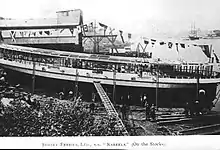
Built in 1905, Kareela's hull, cabins and deck fittings were by Morrison & Sinclair Ltd, of Balmain. Her hull was flamed right out with no overhanging sponsons. The sponsons were made of 14 x 10 inch iron bark girders, and the vessel was double framed of hard wood making it one of the harbour's strongest ferries at the time.[1] The hull of the ferry was designed by Scolt, s foreman shipwright of the North Coast Steam Navigation Co, from a specification by T Brown, the Sydney Ferries Ltd works manager. The cabins and other deck fittings were designed by the companies' officials, under the supervision of T Brown.[2] She had one iron bulkhead and four of wood. She was built with lodging knees around the inside of the hull and 24 hanging knees. The keel consisted of three lengths of iron bark, the longest being 50 feet. There were 20 iron stanchions in the engine and boiler rooms. Under the deck over the boilers were galvanised iron sheets minimise fire risk.[2]
She was 186 tons, 34.4 m in length, and had a passenger capacity of 784.
Kareela was the first of Sydney Ferries Limited to have upper decks fully enclosed. The earlier K-class vessels, including Kurraba, Kirribilli, Koree and Kulgoa had only the sides of their upper decks enclosed leaving the ends open, with the roofs being squared off. On Kareela and all subsequent K-class vessels had an upper deck structure with curving roof lines that met at the rear of the wheelhouses thus the upper deck saloon was fully enclosed.[3] Kareela had four companionways, two on each side, leading to the upper deck.[1]
Her boilers 40 hp triple expansion steam engine was supplied by Chapman & Co Ltd and pushed her to 10 knots. The compound surface condensing engines had cylinders 14 inches x 27 inches in diameter, with a stroke of 18 inches.[1] The electrics, including 83 16-cp incandescent light fittings, were provided by Scott, Henderson and Co.[1] Her two steering wheels were made from teak taken from the former HMS Nelson.[1]
Service history
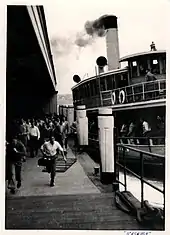
Kareela was launched on 31 May 1905. Among those present were Mr Russell (Chairman of directors), W G Todd (secretary Sydney Ferries, Limited), and Mr Sinclair (of Morrison and Sinclair). The vessel was christened by Miss Enid Russell (thought to be the chairman's daughter), who broke a bottle of champagne on the propeller of the vessel.[2] Her trials were on 7 September 1905 and she entered service 4 days later[4] initially on the Neutral Bay run. Kareela earned the nickname "The Box", which may have been due to appearing to not float any lower in the water no matter how many passengers she was carrying.[5]
In 1932, the Sydney Harbour Bridge was opened, and Sydney Ferries Ltd's annual patronage dropped from 40 million to about 15 million. Almost 20 Sydney Ferry Limited boats were put up for sale, however, Kareela was one of the boats kept on. The post-Bridge drop in demand for the ferry fleet was somewhat mitigated as many could not afford their own transport in the Great Depression of the 1930s and rationing of fuel during World War 2 made the coal required for the steam ferries relatively cheap.[6]
However, the post World War II years saw the drop in demand pick up pace. In 1951, with annual patronage down to 9 million, the NSW State Government took over Sydney Ferries Limited and its remaining fleet and assets. The Port Jackson and Manly Steamship Company, which ran the Manly service, was paid to run the services. The services and fleet were quickly rationalised with most of the larger remaining timber K-class steamers being decommissioned. Kirrule, Kiandra, Kamiri and Kirawa were all broken up at this time. Kareela, however, was again retained in service. The reprieve was short-lived and in 1959, she was sold for breaking up after Kosciusko returned to service following her conversion to diesel power.
Incidents
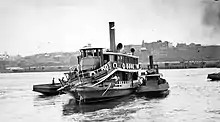
The worst incident in Kareela's career was on 28 August 1924, when she crashed into the P&O wharf on Bennelong Point having just left Circular Quay for Taronga Zoo. A three week old baby, his mother and grandmother died.[7] The three, and other injured family members, had been sitting outside at the front of the ferry. The ferry hit with such force that the wharf deck sliced deep into the ferry under the roof of its main deck.[8] The steering pole was smashed, much of the bulwarks ripped out, a lifeboat thrown onto the wharf and much of the cabin's walls and windows were destroyed. The front part of the ferry's upper deck collapsed as it was later towed from the wharf. Her hull, however, remained intact. The wharf also suffered significant damage with decking smashed and four piles broken. Damage to the ferry was estimated at £600 while damage to the wharf was around £200. A jammed steering gear was found to be the cause, and the master's ticket was suspended for two year's for not testing the wheel at departure.[8][9][10][11]
Over the rest of her career, Kareela had other incidents, but none as serious as the fatal 1924 collision:
- On 29 January 1911, Kareela collided with Balmain New Ferry Company steamer Lady Carrington near Bradleys Head. Neither ferry was carrying passengers. Much of Lady Carrington's starboard bulwark was torn away, however, Kareela suffered little damage.[12]
- In 1914, she collided with a then new Barrenjoey.[13]
- On 26 May 1921, she collided with Manly ferry Balgowlah.[14]
- On 9 January 1924, whilst leaving Sydney Cove on a trip to Taronga Zoo, Kareela collided with Manly ferry Barrenjoey, which was entering the Cove to berth at Circular Quay. The smaller timber Kareela suffered significant damage to her port bow, while the larger steel Barrenjoey had damage to her sponson.[15]
- Returning to Circular Quay with a weekend load of passengers from Taronga Zoo on 15 March 1930, she failed to stop and hit the retaining wall, shattering both her bow timbers and the Quay pavement.[16]
- On 28 October 1932, Kareela collided with the oil lighter, Voco, whilst traveling from Waterview Bay to McMahons Point to coal. The Voco sustained light damaged, however, 5 drums of oil were swept from the Voco, only four of which were recovered.[17]
- On 2 August 1937, she ran into piles at Circular Quay damaging her superstructure.[18]
Gallery
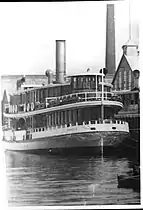 Being fitted out at her builders, Morrison and Sinclair in Balmain, 1905
Being fitted out at her builders, Morrison and Sinclair in Balmain, 1905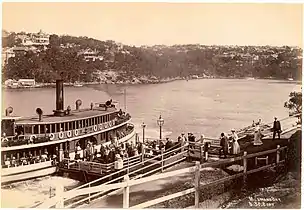 At Musgrave Street Wharf (now "Mosman South"), 1910
At Musgrave Street Wharf (now "Mosman South"), 1910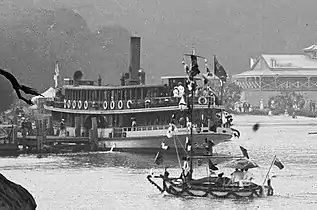 At Clifton Gardens, circa 1910s
At Clifton Gardens, circa 1910s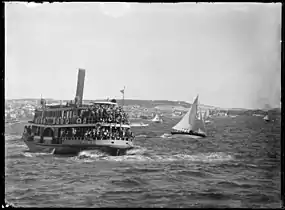 As a weekend spectator ferry, 1920s
As a weekend spectator ferry, 1920s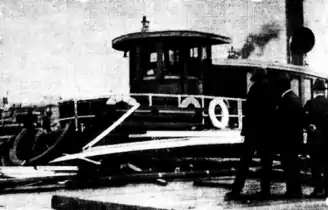 Wedged into wharf after collision. Three people died. 28 August 1924
Wedged into wharf after collision. Three people died. 28 August 1924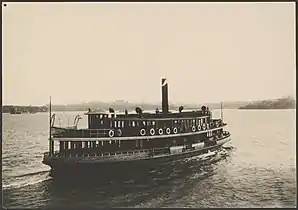 on Sydney Harbour ca. 1930
on Sydney Harbour ca. 1930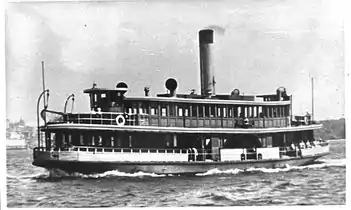 Steaming towards Cremorne Point, 1950s
Steaming towards Cremorne Point, 1950s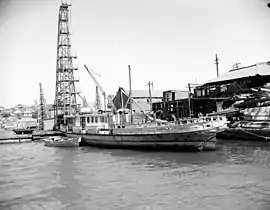 Being broken up at Balmain, December 1959
Being broken up at Balmain, December 1959
Notes
- "The New Ferry Steamer "Kareela."". The Mosman, Neutral And Middle Harbour Resident. New South Wales, Australia. 23 September 1905. p. 10. Retrieved 23 May 2020 – via Trove.
- "NEW FERRY BOAT". The Australian Star (FIRST ed.). New South Wales, Australia. 11 May 1905. p. 7. Retrieved 24 May 2020 – via Trove.
- Clark, L (1976). North of the Harbour. Broadmeadow, NSW: Newey & Beath Printers Pty Ltd. p. 10. ISBN 0-909650-05-5.
- Ferries of Sydney – Kareela
- Andrews, Graeme. "Graeme Andrews "Working Harbour Collection"". City of Sydney archives. City of Sydney. Retrieved 23 May 2020.
- Kirawa on ferriesofsydney.com
- "KAREELA SMASH". Tweed Daily. New South Wales, Australia. 2 September 1924. p. 5. Retrieved 24 May 2020 – via Trove.
- "TERRIBLE CRASH". The Sydney Morning Herald. 29 August 1924. p. 9. Retrieved 24 May 2020 – via Trove.
- "COURT OF MARINE INQUIRY". The Sydney Morning Herald. 4 October 1924. p. 14. Retrieved 24 May 2020 – via Trove.
- "Ferry Steamer Crashes Into Wharf". The Daily Telegraph. Sydney. 29 August 1924. p. 12. Retrieved 24 May 2020 – via Trove.
- "KAREELA SMASH". The Daily Telegraph. Sydney. 4 October 1924. p. 17. Retrieved 24 May 2020 – via Trove.
- "FERRY COLLISION". The Sydney Morning Herald. 30 January 1911. p. 9. Retrieved 24 May 2020 – via Trove.
- SS Barrenjoey/MV North Head Ferries of Sydney
- "HARBOUR COLLISION". Cootamundra Herald. New South Wales, Australia. 26 May 1921. p. 1. Retrieved 24 May 2020 – via Trove.
- "FERRIES COLLIDE". The Sydney Morning Herald. 10 January 1924. p. 9. Retrieved 24 May 2020 – via Trove.
- "FERRY KAREELA HITS WALL". The Labor Daily. New South Wales, Australia. 17 March 1930. p. 4. Retrieved 23 May 2020 – via Trove.
- "KAREELA DAMAGED". The Daily Telegraph. Sydney. 29 October 1932. p. 3. Retrieved 24 May 2020 – via Trove.
- "FERRY COLLIDES WITH PILES". The Labor Daily. New South Wales, Australia. 3 August 1937. p. 5. Retrieved 24 May 2020 – via Trove.
References
- Andrews, Graeme (1975). The Ferries of Sydney. A.H. & A.W. Reed Pty Ltd. p. 29. ISBN 0589071726.
- Andrews, Graeme (1982). A Pictorial History of Ferries: Sydney and Surrounding Waterways. Sydney: AH & AW Reed Pty Ltd. ISBN 0589503863.
- Gunter, John (1978). Across the harbour : the story of Sydney's ferries. Rigby. ISBN 0727007157.
Prescott, A M (1984). Sydney Ferry Fleets. Magill, South Australia: Ronald H Parsons. ISBN 0-909418-30-6.
External links
 Media related to Kareela (ship, 1905) at Wikimedia Commons
Media related to Kareela (ship, 1905) at Wikimedia Commons